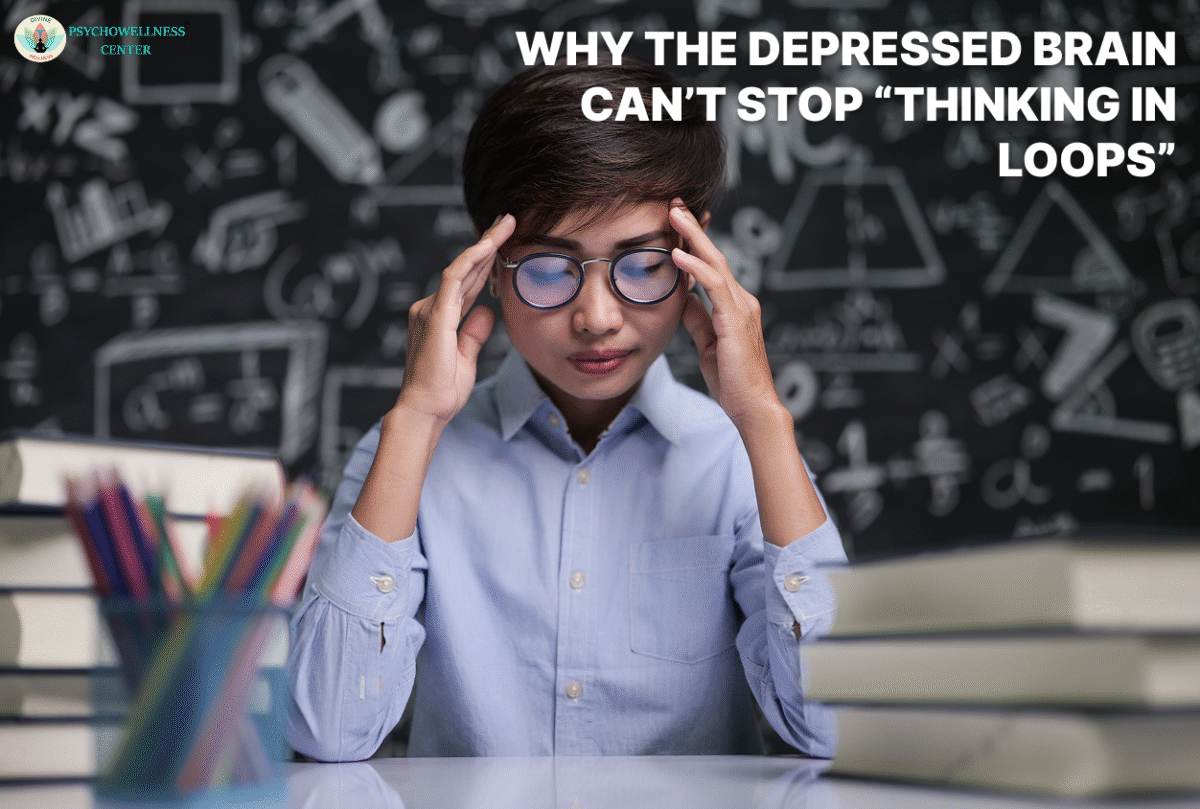Many people with depression experience what can be described as “thinking in loops.” This phenomenon can be frustrating and overwhelming, making it difficult to escape the clutches of despair. Understanding why this happens is the first step toward breaking free from these cycles and seeking help.
At the heart of “thinking in loops” is rumination, a psychological process where individuals repeatedly focus on negative thoughts, often exacerbated by depression. This mental loop involves incessantly analysing past mistakes, perceived failures, or future anxieties without achieving any resolution, leading to increased feelings of hopelessness and despair. Depression alters brain function, particularly affecting the prefrontal cortex, responsible for decision-making and emotional regulation, making it less active, while the amygdala, which processes emotions, becomes hyperactive. This imbalance creates a cycle where heightened emotional responses trap individuals in negative thought patterns, making it difficult to move forward and escape the clutches of despair. Understanding these dynamics is crucial for recognising the challenges faced by those with depression and emphasises the need for effective interventions.
The Impact of Looping Thoughts
Thinking in loops can have several detrimental effects on both mental and physical health. Increased anxiety is a common consequence; as thoughts spiral, they can lead to heightened feelings of panic and worry. Moreover, the physical symptoms of stress, such as tension headaches, fatigue, and sleep disturbances, can compound these issues, making it even harder to break the cycle.
Additionally, looping thoughts can affect one’s relationships. When an individual is consumed by their own mental turmoil, they may withdraw from friends and family, leading to feelings of isolation. This social withdrawal can further exacerbate depressive symptoms, creating a cycle that seems impossible to break.
Strategies to Break the Cycle
While understanding the mechanics behind thinking in loops is important, it’s equally crucial to find ways to combat this tendency. Here are some strategies that can help:
- Mindfulness and Meditation
Practising mindfulness can significantly reduce rumination. Mindfulness is about being present and noticing thoughts without any form of criticism. Techniques such as meditation, deep breathing, or yoga can help calm the mind and lower anxiety levels. By training the brain to focus on the present, individuals can create space for more positive thoughts.
- Cognitive Behavioural Therapy (CBT)
CBT is a popular therapeutic method that assists individuals in recognising and altering detrimental thought processes. It motivates individuals to question their repetitive thoughts and substitute them with more balanced viewpoints. Numerous individuals discover that collaborating with a therapist can equip them with the resources necessary to escape harmful thought patterns.
- Journaling
Writing down thoughts can serve as an effective outlet for processing emotions. Journaling allows individuals to externalise their thoughts, making them feel less overwhelmed. By articulating their feelings on paper, they can gain perspective and potentially identify patterns that contribute to their ruminative cycles.
- Physical Activity
Regular exercise has been shown to improve mood and reduce symptoms of depression. Physical activity releases endorphins, which can enhance feelings of well-being. Even a simple walk outside can help clear the mind and reduce the intensity of looping thoughts.
- Connecting with Others
Social support is vital for mental health, and sharing experiences can help individuals feel less isolated. Sometimes, just knowing someone is listening can help break the cycle of negative thinking.
Seeking Professional Help
If you find yourself consistently caught in loops of negative thinking, it may be time to seek professional help. A mental health professional, such as an online counsellor or online psychiatrist, can provide guidance tailored to your specific needs. They can help you understand the underlying issues contributing to your depression and work with you to develop effective coping strategies.
Conclusion
The experience of “thinking in loops” can feel isolating and overwhelming, but it’s important to remember that you are not alone. Understanding the mechanics behind these persistent thought patterns is a critical first step toward recovery. Strategies like mindfulness, cognitive behavioural therapy (CBT), and physical activity can help interrupt the cycle and restore emotional balance.
If you’re caught in cycles of overthinking, emotional pain, or anxiety that won’t let up, seeking professional help can be a life-changing decision. Whether you’re searching for the best psychologist near me or prefer the flexibility of online counselling, support is more accessible than ever. TalktoAngel offers secure, confidential therapy tailored to your individual needs, helping you regain clarity and control.
For those who prefer in-person sessions, the PsychoWellness Centre, with locations in Janakpuri and Dwarka Sector-17, provides expert care from compassionate clinicians specialising in emotional resilience, trauma recovery, and depression management. You can reach them at 7827208707 or 011-47039812.
There is hope, and with the right psychological support, it is absolutely possible to break free from the cycle of negative thinking and reclaim a sense of peace, purpose, and well-being.
This write-up draws on the expertise of Clinical Psychologist Dr. R.K. Suri and Counselling Psychologist Ms. Swati Yadav, who share effective approaches and techniques designed to promote lasting mental well-being.
This blog was posted on 30 September 2025.
References
Nolen-Hoeksema, S. (2001). Gender Differences in Depression. Current Directions in Psychological Science, 10(5), 173-176.
Gotlib, I. H., & Joormann, J. (2010). Cognition and Depression: Current Status and Future Directions. Annual Review of Clinical Psychology, 6, 285-307.
Hayes, S. C., & Hofmann, S. G. (2017). Acceptance and Mindfulness Treatments for Anxiety and Depression: A Review. Journal of Consulting and Clinical Psychology, 85(5), 377-389.
Understanding 7 Different Types of Depression – Psychowellness Center
Social Media Use and Depression – Psychowellness Center
Understanding the Cognitive Triad of Depression | Blog | TalktoAngel
talktoangel.com/blog/things-to-know-about-depression

